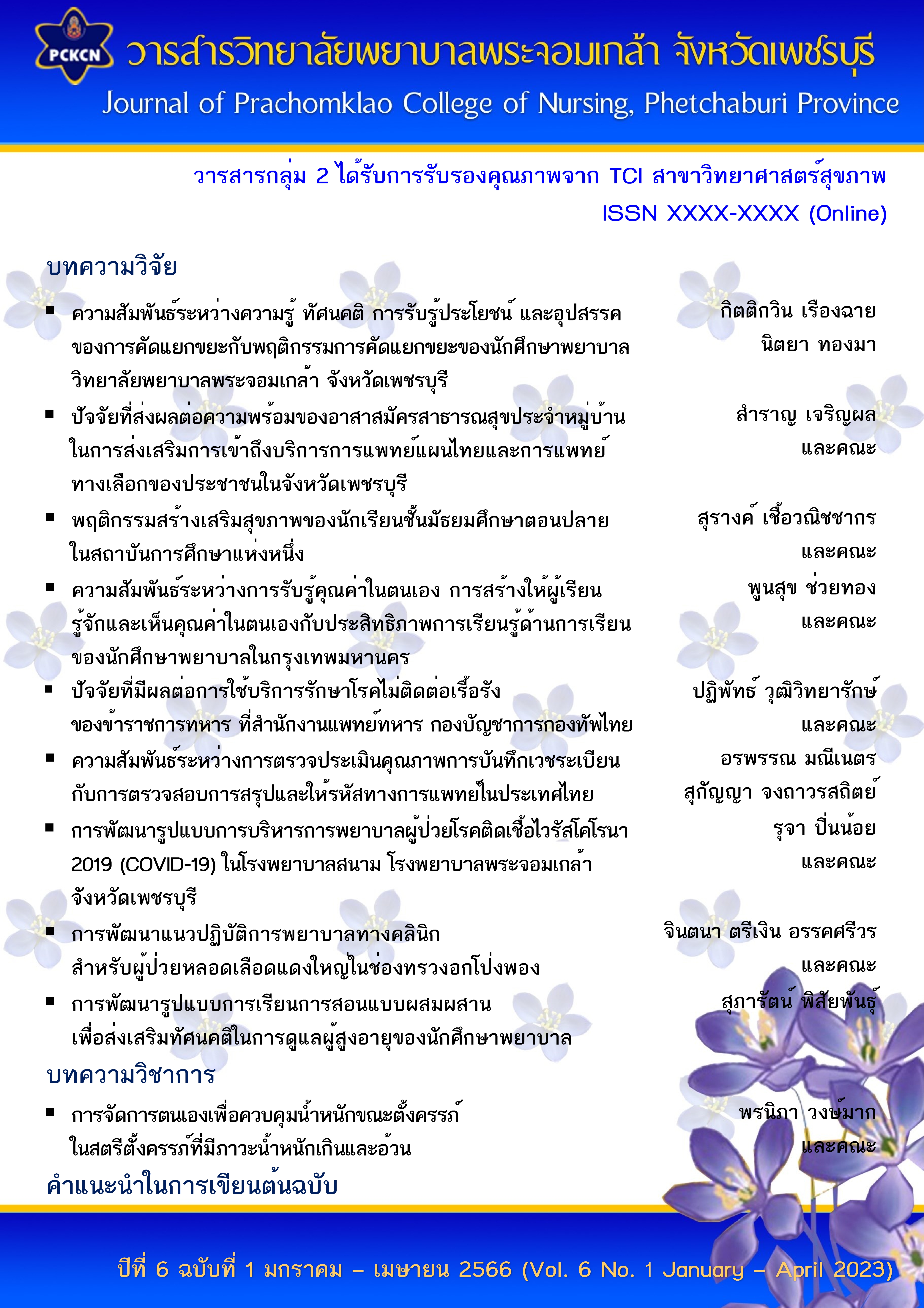การพัฒนารูปแบบการเรียนการสอนแบบผสมผสานเพื่อส่งเสริมทัศนคติ ในการดูแลผู้สูงอายุของนักศึกษาพยาบาล
Main Article Content
บทคัดย่อ
การวิจัยและพัฒนานี้ มีวัตถุประสงค์เพื่อพัฒนารูปแบบการเรียนการสอนแบบผสมผสานเพื่อส่งเสริมทัศนคติในการดูแลผู้สูงอายุของนักศึกษาพยาบาล มีวิธีดำเนินการวิจัย 3 ระยะ คือ 1) การศึกษาสถานการณ์การเรียนการสอนเพื่อส่งเสริมทัศนคติในการดูแลผู้สูงอายุ เก็บรวบรวมข้อมูลโดยการสนทนากลุ่มนักศึกษาพยาบาล ชั้นปีที่ 2 จำนวน 10 คน ซึ่งได้จากการเลือกแบบเจาะจง เครื่องมือที่ใช้ในการวิจัย คือแบบสัมภาษณ์กึ่งโครงสร้าง และวิเคราะห์ข้อมูลโดยการวิเคราะห์เนื้อหา 2) การพัฒนารูปแบบการเรียนการสอนแบบผสมผสานเพื่อส่งเสริมทัศนคติในการดูแลผู้สูงอายุ 3) การศึกษาประสิทธิผลของรูปแบบการเรียนการสอนแบบผสมผสานเพื่อส่งเสริมทัศนคติในการดูแลผู้สูงอายุ ซึ่งเป็นการวิจัยกึ่งทดลองแบบกลุ่มเดียววัดผลก่อนและหลังการทดลอง กลุ่มตัวอย่างเป็นนักศึกษาพยาบาล ชั้นปีที่ 2 จำนวน 30 คน คัดเลือกโดยการสุ่มอย่างง่าย เครื่องมือที่ใช้ในการวิจัย ได้แก่ รูปแบบการเรียนการสอนแบบผสมผสานเพื่อส่งเสริมทัศนคติในการดูแลผู้สูงอายุ และแบบสอบถามทัศนคติที่มีต่อผู้สูงอายุ วิเคราะห์ข้อมูลโดยสถิติพรรณนาและการทดสอบทีแบบไม่เป็นอิสระต่อกัน
ผลการวิจัยพบว่า 1) สถานการณ์การจัดการเรียนการสอนเกี่ยวกับทัศนคติในการดูแลผู้สูงอายุ พบว่า นักศึกษาพยาบาลให้ความสำคัญต่อทัศนคติในการดูแลผู้สูงอายุน้อย และต้องการให้มีการจัดการเรียนการสอนที่ส่งเสริมทัศนคติในการดูแลผู้สูงอายุ 2) รูปแบบการเรียนการสอนแบบผสมผสานเพื่อส่งเสริมทัศนคติในการดูแลผู้สูงอายุ ประกอบด้วย การบรรยาย สถานการณ์จำลองเป็นผู้สูงอายุ การฝึกปฏิบัติการพยาบาลผู้สูงอายุ และการสะท้อนคิด 3) นักศึกษาพยาบาลมีทัศนคติในการดูแลผู้สูงอายุสูงกว่าก่อนการเรียน (t = -17.09, p < .01)
การศึกษานี้แสดงให้เห็นว่า รูปแบบการเรียนการสอนแบบผสมผสานที่พัฒนาขึ้นสามารถช่วยส่งเสริมทัศนคติในการดูแลผู้สูงอายุของนักศึกษาพยาบาล จึงควรนำรูปแบบการเรียนการสอนแบบผสมผสานไปใช้ในวิชาการพยาบาลผู้สูงอายุ เพื่อส่งเสริมให้นักศึกษาพยาบาลเกิดทัศนคติที่ดีในการดูแลผู้สูงอายุและสามารถให้การพยาบาลครอบคลุมองค์รวม
Downloads
Article Details

อนุญาตภายใต้เงื่อนไข Creative Commons Attribution-NonCommercial-NoDerivatives 4.0 International License.
เนื้อหาและข้อมูลที่เผยแพร่ในวารสารวิทยาลัยพยาบาลพระจอมเกล้า จังหวัดเพชรบุรี ถือเป็นข้อคิดเห็นและความรับผิดชอบของผู้นิพนธ์บทความโดยตรง บทความ เนื้อหา ข้อมูล รูปภาพ ฯลฯ ที่ได้รับการเผยแพร่ในวารสารนี้ ถือเป็นลิขสิทธิ์ของวารสารฯ หากบุคคลหรือหน่วยงานใดต้องการนำทั้งหมดหรือส่วนหนึ่งส่วนใดไปเผยแพร่หรือเพื่อกระทำการใด ๆ จะต้องอ้างอิงวิทยาลัยพยาบาลพระจอมเกล้า จังหวัดเพชรบุรี ทุกครั้ง
เอกสารอ้างอิง
Anekwit, N., Vibulchai, N., Noomsang, P., Kaichan, S., Wangwan, P., & Sanyabut, C. (2018). Supplementary curriculum development to enhance nursing students’ competencies to care for the elderly in the community based on contemplative education. Nursing Journal of the Ministry of Public Health, 28(1), 88-102. (in Thai)
Ankanawin, U., Untaja, P., Bohplian, S., & Meeparn, A. (2018). The development of nursing students to engage in gerontological nursing. Journal of The Royal Thai Army Nurses, 19(2), 95-102. (in Thai)
Attafuah, P. Y. A., Amertil, N., Sarfo, J. O., Deegbe, D. A., Nyonator, D., Amponsah-Boama, C., & Abuosi, A. A. (2022). ‘I decided to attend to him because it’s my duty’: Student nurses’ perception and attitude towards care of older adults. BMC Medical Education, 22, Article 23. https://doi.org/10.1186/s12909-021-03090-z
Demirtas, A., & Basak, T. (2021). Daily life activities simulation: Improving nursing students' attitudes toward older patients. Japan Journal of Nursing Science, 18(1), Article 12375. https://doi.org/10.1111/jjns.12375
Faul, F., Erdfelder, E., Buchner, A., & Lang, A. G. (2009). Statistical power analyses using G* Power 3.1: Tests for correlation and regression analyses. Behavior Research Methods, 41(4), 1149-1160.
Ghimire, S., Shrestha, N., Callahan, K. E., Nath, D., Baral, B. K., Lekhak, N., & Singh, D. R. (2019). Undergraduate nursing students’ knowledge of aging, attitudes toward and perceptions of working with older adults in Kathmandu Nepal. International Journal of Nursing Sciences, 6(2), 204-210.
Hsu, M. H. K., Ling, M. H., & Lui, T. L. (2019). Relationship between gerontological nursing education and attitude toward older people. Nurse Education Today, 74, 85-90.
Intolo, S., Kakandee, A., Tangpathomwong, C., Chantratip, P., Anseekaew, P., Pranudta, S., & Boonmas, N. (2020). Attitudes and perspectives toward the older persons of the second-year nursing students of Srimahasarakham Nursing College. Journal of Boromarajajonani College of Nursing, Surin, 10(1), 91-103. (in Thai)
Karuncharernpanit, S., & Seesanea, S. (2017). Development of nursing students’ competency enhancing program regards comprehensive geriatric assessment using experiential learning. Nursing Journal of the Ministry of Public Health, 27(2), 168-180. (in Thai)
Kittiboonthawal, P., Cheanchum, J., Srithanya, S., & Umereweneza, S. (2018). Reflection: Transformation from valuable experiences. Journal of Health Science Research, 12(1), 102-110. (in Thai)
Kogan, N. (1961). Attitudes toward old people: The development of a scale and an examination of correlates. The Journal of Abnormal and Social Psychology, 62(1), 44-54.
Leethong-in, M., & Piyawattanapong, S. (2015). Predicting factors of age-friendly nursing care behavior by nursing students-nursing practice subject. Journal of Nursing and Health Care, 33(3), 70-79. (in Thai)
Lwanga, S. K., Lemeshow, S., & World Health Organization. (1991). Sample size determination in health studies: A practical manual. World Health Organization. https://apps.who.int/iris/handle/10665/40062
Martínez-Arnau, F. M., López-Hernández, L., Castellano-Rioja, E., Botella-Navas, M., & Pérez-Ros, P. (2022). Interventions to improve attitudes toward older people in undergraduate health and social sciences students. A systematic review and meta-analysis. Nurse Education Today, 110(105269). doi.org/10.1016/j.nedt.2022.105269
National Statistical Office. (2022). The 2021 survey of older persons in Thailand. https://www.nso.go.th/sites/2014/DocLib13 /ด้านสังคม/สาขาประชากร/ประชากรสูงอายุ/2564/full_report_64.pdf (in Thai)
Petty, R. E., & Cacioppo, J. T., (1986). The elaboration likelihood model of persuasion. In R. E. Petty, & J. T. Cacioppo (Eds.), Communication and persuasion: Central and peripheral routes to attitude change (pp. 1-24). Springer.
Runkawatt, V. (2007). Evaluation of the psychometric properties of the Thai versions of palmore's facts on aging quiz and Kogan's attitude toward old people in Thai adolescents. State University of New York at Buffalo.
Saleh, N. M., Meawad, E. B., El-Aziz, A., Noshy, H., & El-Gilany, A. H. (2017). Effect of simulated aging game versus traditional lecture on nursing students' knowledge and attitude towards elderly. Alexandria Scientific Nursing Journal, 19(1), 163-176.
Samra, R., Griffiths, A., Cox, T., Conroy, S., & Knight, A. (2013). Changes in medical student and doctor attitudes toward older adults after an intervention: A systematic review. Journal of the American Geriatrics Society, 61(7), 1188-1196.
Sari, D., Taskiran, N., Baysal, E., Acar, E., & Akyil, R. C. (2020). Effect of an aged simulation suit on nursing students’ attitudes and empathy. European Geriatric Medicine, 11(4), 667-675.
Setchoduk, K. (2015). Attitudes toward older adults among nursing students in a private university, Thailand. Journal of Public Health and Development, 13(2), 3-16. (in Thai)
Singhasem, P., Nawsuwan, K., & Suwanwaha, S. (2019). Development of an instructional model to enhance gerontological nursing competencies among nursing students. Journal of Health Science, 28(Special), 65-78.
Thongcharoen, V. (2013). Illness and concepts in gerontological nursing. In V. Thongcharoen (Ed.), Art and science in gerontological nursing (pp. 23-42). Textbook Project, Mahidol University. (in Thai)
Valiathan, P. (2002). Blended learning models. Learning Circuits,3(8), 50-59.


